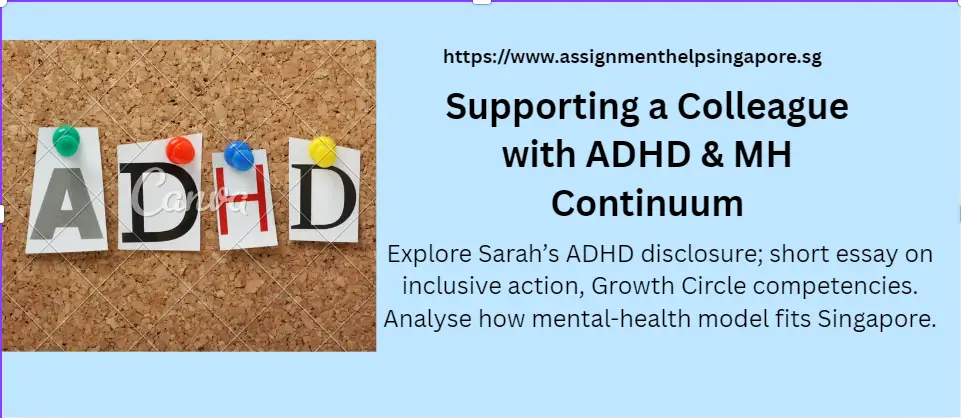
Contents
- 1 PSY213: Supporting a Colleague with ADHD — Team Response & MH Continuum
- 1.1 Nursing Assignment Answers: Expert Answers on Above Questions
- 1.2 Check Nursing Assignment Samples Written by Experts
- 1.2.1 Feasibility Study on Elderly Home Care in Singapore
- 1.2.2 Tourniquet-Free Total Knee Arthroplasty Effect on Patient
- 1.2.3 Reducing (CAUTIs) Through a Nurse Driven Protocol
- 1.2.4 Nursing Care Plan for Older People in Singapore
- 1.2.5 Health Promotion Initiative for Addressing the Menace of Obesity in Singapore
- 1.3 Study Guides and Resources to Help You With Nursing Essays
PSY213: Supporting a Colleague with ADHD — Team Response & MH Continuum
Read the scenario below.
You and your colleagues, Sarah and Imran, were working in a shared office space on a proposal for a major client presentation due later that evening. Sarah was fidgeting, scrolling through open browser tabs, and had missed key parts of the conversation. She was also late in submitting her section of the proposal, which had caused delays in the group’s progress.
The day before, Sarah had confided in you during a coffee break that she was diagnosed with Attention Deficit Hyperactivity Disorder (ADHD). She explained how she often struggled with time management, task prioritisation, and staying focused—especially under pressure. She also shared that she found it hard to stay on track when working on long-term projects and often felt overwhelmed by multiple deadlines.
The following exchange took place:
Imran: I’ve reorganised the proposal structure. Sarah, did you manage to finish your part?
Sarah: I’ve been working on it, but I kept jumping between ideas. I’m not done yet.
Imran: We’re all juggling things, Sarah. You can’t keep dropping the ball like this when we’re this close to the deadline.
Sarah (visibly agitated): I’m trying, okay? I just… I keep losing my train of thought.
Imran looked frustrated and turned back to his laptop without saying anything. You recognised that the tension needed to be addressed.
Choose how you would respond to the situation with one of the following options:
(A) Sarah, we all have our challenges, but we need reliability in a team. Maybe you should take a smaller role going forward.
(B) Hey Sarah, I know staying focused can be tough — want to quickly break down what’s left and tackle it together?
(C) Let’s just move on without Sarah’s part for now — we can’t afford to fall behind.
(D) It looks like everyone’s stressed. Let’s pause for a moment, reassess what’s left, and divide the next steps more clearly.
Demonstrate and practice basic competencies learned from Growth Circle sessions by writing an essay explaining your decision. Provide an elaboration of how you would respond to better support your selected option.
Note: There is no one correct answer, although some options might be better than others. Marks will be awarded based on your critical reasoning skills.
Question
Read the following required reading by Saraceno et al. (2015): (See attached PDF.)
The World Health Organization’s Eastern Mediterranean Regional Office (EMRO) emphasises that “mental health services should be based in the community and include a coordinated range of services that vary in intensity depending on individual needs.” It highlights the pressing need to transition from centralised, institutional mental health services to community-based models. This shift addresses the significant treatment gaps caused by over-reliance on specialised institutions and the scarcity of mental health professionals in the region. By integrating mental health care into primary health systems and expanding community-based services, the approach aims to provide more accessible, equitable, and holistic care for individuals with mental health conditions.
Using the framework proposed by EMRO, explain the concept of the mental health continuum and how it supports the development of flexible, community-based care systems. Then, apply this understanding to the population in Singapore: describe TWO key factors influencing Singaporeans’ mental health and well-being, and how might a tiered, community-based model address their diverse needs across the mental health spectrum.
Nursing Assignment Answers: Expert Answers on Above Questions
The options selected is D which is pause, reassess tasks and divide next steps clearly.
The reason behind selection of option D is it treats the immediate problem rather than personal failing. It helps in reducing tension and avoids singling Sarah out. The other benefits include psychological safety and supporting inclusivity. The steps included are :
1) pause and acknowledge stress.
2) list what is left out and assign tasks
3) breakdown the work of Sarah into smaller chunks.
4) provide private assistance after the meeting.
Mental health continuum
The mental health exists on a spectrum such as well being, distress, disorder and the care should properly match with need intensity through community based services.
Singapore factors: The Singaporean factors include high work pressure which leads to stress, anxiety and burnout. The stigma/law help seeking is because of delays in care.
Community based model response:
Universal promotion through awareness campaigns and workplace programs, targeted residence training for high risk groups, primary care accessibility via tele health and specialist community teams and NGO for severe cases.
| Disclaimer: This answer is a model for study and reference purposes only. Please do not submit it as your own work. |
Want a Full Worked Out Answer with References?
Check Nursing Assignment Samples Written by Experts
Study Guides and Resources to Help You With Nursing Essays
Related answers
Biomedical Device Startup Mission, Needs & Concept Design
Journal Article Review: Physical Activity & Health
LifeLab Case Study: Behaviour Change and Caregiver Empathy
Nutrition Assessment Case Study Using S.O.A.P Method
Whorlton Hall Inquiry | Ethical and Legal Healthcare Analysis
Chronic Condition Nursing Portfolio: Assessment & Care Guide
Care Transition Facility Analysis Report Singapore
Singapore Health Policy Brief: Structure & Requirements
Hip Fracture Case Study: Assessment, Surgery & Care Plan
Healthcare Access Inequalities: Thailand, US & Singapore



